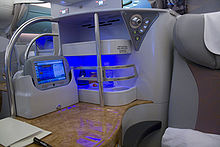| This article includes a list of general references, but it lacks sufficient corresponding inline citations. Please help to improve this article by introducing more precise citations. (April 2018) (Learn how and when to remove this message) |

Business travel is travel undertaken for work or business purposes, as opposed to other types of travel, such as for leisure purposes or regularly commuting between one's home and workplace.
Relatively recently, the rise of videotelephony have cause a reduction of business travel.
Jobs involving business travel
In the twenty-first century, many jobs involve periodic or frequent business travel. Common careers involving business travel include:
- Salespeople
- Sales engineers
- Executives
- Field engineers
- Project managers
- Trainers
- Consultants
Additionally, it is common to see doctors, nurses, and other medical professionals flying for work. Often lawyers, politicians, athletes, clergy, military, academics, and journalists conduct business travel on a regular basis. Many organisations require their staff to take account of a travel policy when deciding whether, how, and at what cost to travel for business. Such a policy is derived from both the organisation's policies on expenditure and value for money, and the exercise of its duty of care to its staff. The contribution of corporate travel policies to employees' job satisfaction has been noted by travel management and HR professionals. Whilst management approval for travel may be important in many businesses, it has been noted that some organizations are relaxing or ending the requirement for pre-trip approval.
Negatives to business travel
Employees who travel for work on a regular basis often experience loneliness, depression, and reduced mental health. In 2019, 1 in 5 business travelers reported business travel negatively affected their mental health. Additionally, they may miss important family events, creating additional relationship stress.
Positives to business travel
Business travel has many positive benefits for employees the largest being the opportunity to see parts of the world at the company's expense. Today, many business travellers incorporate bleisure travel into their work travel. Studies on cases imply performance increases during travel. According to a survey, 88% of small business owners enjoy business travel.
See also
References
- The C. Boarding Group (9 May 2019). "23 Jobs with Travel - the ultimate list of travel jobs (that will take you around the world)". C Boarding Group - Business Travel. Retrieved 20 January 2020.
- H M Treasury Group, HM Treasury Group – travel and expenses policy, sections 2.1 and 2.2, published June 2013, accessed 5 March 2023
- ^ "2022 Corporate Travel Leaders Outlook". Cirium. Retrieved 2 June 2022.
- "Study: More than 20 Percent of Business Travelers Cite Negative Mental Health Effects: Business Travel News". www.businesstravelnews.com. Retrieved 20 January 2020.
- Landrum, Sarah. "How Millennials Are Redefining Business Travel". Forbes. Retrieved 20 January 2020.
- Zak, Uri (28 August 2021). "The performance advantage of traveling". Journal of Economic Psychology. 87: 102431. doi:10.1016/j.joep.2021.102431.
- Haileyesus, Samson (12 January 2020). "88% of Small Business Owners Enjoy Business Travel". Small Business Trends. Samson Haileyesus.
Bibliography
- Davidson, Rob; Cope, Beulah (2003), Business Travel: Conferences, Incentive Travel, Exhibitions, Corporate Hospitality, and Corporate Travel, Pearson Education, ISBN 9780582404441
- Beaverstock, Jonathan; Derudder, Ben; Faulconbridge; Witlox (2012), International Business Travel in the Global Economy, Ashgate Publishing, ISBN 9781409488439
- Swarbrooke, John; Horner, Susan (2012), Business Travel and Tourism, Routledge, ISBN 9781136423062
External links
![]() Business travel travel guide from Wikivoyage
Business travel travel guide from Wikivoyage
- Corporate Travel Leader's Outlook report on how business travel has been changing since the height of the pandemic.